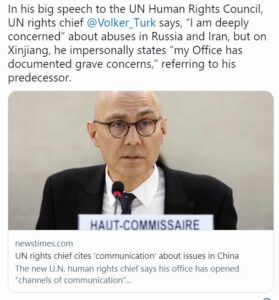Volker Türk’s first speech falls short of activists’ hopes for a tougher stand after UN report on abuses in Xinjiang.
The new United Nations human rights chief has said his office has opened “channels of communication” to help follow up on concerns about the rights of minorities in the western Xinjiang region of China, including Uighur Muslims and Tibetans.
In a highly anticipated address on Tuesday, which marked the first presentation of the office’s annual report since he took office in October, UN High Commissioner for Human Rights Volker Türk noted that his office had called for a “concrete follow-up” on abuses including arbitrary detentions and family separations in Xinjiang.
“We also have concerns about the severe restriction of civic space more generally, including the arbitrary detention of human rights defenders and lawyers, and the impact of the national security law in Hong Kong,” he said.
Türk has been under pressure from Western nations and rights organisations to take a firm stand on Xinjiang following a bombshell report published in August by his predecessor, Michelle Bachelet, which cited possible crimes against humanity.
His remarks fell short of activists’ hopes for a stronger message to Beijing. The former head of Human Rights Watch, Kenneth Roth, said that Türk had “mouthed not a word of criticism of China”.
“He offers only quiet diplomacy – ‘we have opened up channels of communication’ – as if he has any leverage besides the public reporting/condemnation that he abandons,” Roth tweeted.
Türk’s speech marked the first presentation of his office’s annual report since he took the helm in October. It covered an array of concerns – such as women’s rights, discrimination, conflict and climate change – in a sweeping number of countries, from Afghanistan to Zambia.











